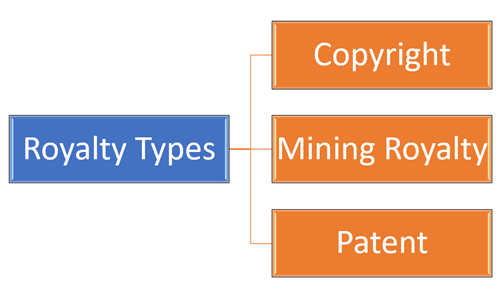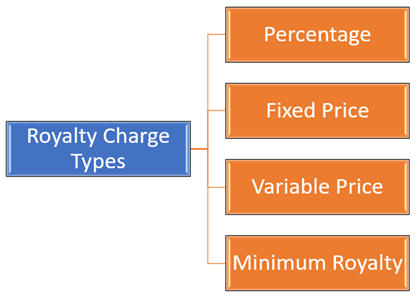What do we mean by Royalty?
Royalty is a lawful restricted payment made to the owner in exchange for the right to use his/her intellectual property or asset. Royalties are paid by the party purchasing the property’s rights to the party that owns it. The party that owns the property is known as a “Licensor” (or the owner), and the party that purchases the rights is known as a "Licensee".
Understanding Royalty
Royalties are payments made by a party that gives it the right to utilize another party’s property. Royalties originate from licensing, which is the process of providing or taking authorization to produce, have, or use something that another party owns or has made it.
In other words, licencing is when someone who keeps the possession of a property gets royalties from somebody who uses that property.
Royalties can be seen across multiple sectors. However, they perform similar tasks everywhere. These royalties are bound by agreements, and they permit others to utilize the property, giving the proprietor the advantage of revenue. Besides, royalties shield the buyer from claims by the proprietor for inappropriate use.
Who can benefit from Royalties?
Royalty can be useful for both the parties, i.e., the proprietor, the owner, and the licensee, the buyer. Proprietors get benefit from royalty as royalty instalments can represent substantial revenue. On the other hand, licensees can profit by paying royalties to access someone’s assets, which they can use to promote, develop, or set up their business.
License Agreements:
A licensing arrangement is a legitimate bond between two parties - the licensor and the licensee. In a licensing agreement, the licensor awards the licensee the option to deliver and sell merchandise, apply a brand name, or utilize patent rights claimed by the licensor. In return, the licensee submits a list of conditions regarding the use of the licensor's property and consents to make instalments known as royalties.
What are the types of Royalties?
There are three types of royalties as covered below:

Kalkine Group Image
- Copyright: Copyright gives a legitimate right to the writer of a book, the picture taker who owns the pictures, or any such sort of scholarly works. Copyright royalty is payable by the publisher of a book to the writer of that book or the picture taker, in light of the publisher’s deal.
- Mining Royalty:Licensee of a mine/quarry pays a royalty to the mine/quarry owner, generally based on the production basis.
- Patent Royalty:The licensee pays patent royalty to the owner based on the production of respective goods.
Types of Royalty Charges
Several methods are used to structure the royalty payments, primarily dependent on the licensing agreement’s framework and conditions.

Kalkine Group Image
- Percentage: In most cases, the royalty payment is being collected on a percentage basis where the licensee agrees to pay a pre-agreed percentage of net gross revenue generated for the entire license agreement duration.
- Fixed Price: Owner may decide a fixed sum to the licensee as a royalty for a fixed duration of time which can be collected regularly.
- Variable Prices: This is mostly applicable for newly created properties and assets that hasn’t proved itself in the market yet. The licensee agrees to pay lower prices for the starting phase up to a point when a certain condition is achieved. The prices get revised after the certain state as per the agreement is met.
- Minimum Royalty: Sometimes licensees agree to a minimum royalty payment regardless of the royalty percentage, or the revenue generated by the owner’s property or asset, the licensor or owner will receive a nominal amount of money.
 Please wait processing your request...
Please wait processing your request...